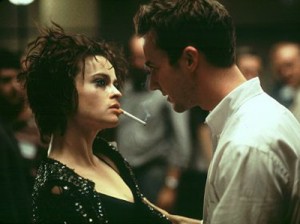Hangover Movie: Fight Club
Fight Club is one of my favorite movies of all time. It was released in theaters in 1999, and since then, it has garnered a cult following of epic proportions. Fight Club was one of the most controversial and talked-about films of the 1990s. Some loved it, some hated it, but everyone talked about it.
Fight Club stars Edward Norton, Brad Pitt, and Helena Bonham Carter. Norton plays the unnamed “everyman” protagonist, and the movie starts off with him trying to get relief from his insomnia. His doctor refuses to give him medication and instead directs him to go to a support group, saying “You wanna see pain? Swing by First Methodist Tuesday nights. See the guys with testicular cancer. That’s pain.”
When Norton’s character starts to attend support groups, and is able to fool the other members into thinking that he is a fellow victim. In the groups, he finds an emotional release that relieves his insomnia. He begins to attend more groups, but his insomnia cure stops working when he realizes that there is another faker in the groups-Marla (played by Helena Bonham Carter). Eventually, he negotiates with her so they are never in the same group.
On a business trip, Norton’s character meets Tyler Durden (Brad Pitt). When he returns home from the trip and finds that there was an explosion that destroyed his apartment, he calls Tyler. The two meet for a beer and Norton’s character ends up moving into Durden’s rundown, filthy house. That same night, Durden invites Norton’s character to hit him, and the two get into a fistfight outside the bar. They continue to fight in the parking lot, and eventually attract a group of men. The group ends up forming a “fight club” in the basement of the bar.
One night, Marla calls Norton’s character saying she has overdosed on pills. Norton’s character sets the phone down, and Durden picks it up. The two start up a sexual relationship. Under Tyler’s direction, the guys in the fight club become the anti-materialist and anti-corporate organization called “Project Mayhem”.
I won’t ruin the ending for those who haven’t seen it, but suffice it to say that what follows is a mind bending series of events that calls into question morality, anti-establishment dogma, and nihilism as a lifestyle. Norton’s character tries to change his life by becoming free of the corporate and societal obligations that weigh him down. The violence is portrayed as a way for 30-somethings to feel in a society where they are otherwise numb. Fight Club plays on the frustration that is common in the “lost” generation, generation X. As Tyler Durden puts it:
“I see all this potential, and I see squandered. God damn it, an entire generation pumping gas, waiting tables; slaves with white collars. Advertising has us chasing cars and clothes, working jobs we hate so we can buy shit we don’t need. We’re the middle children of history, man. No purpose or place. We have no Great War. No Great Depression. Our Great War’s a spiritual war… our Great Depression is our lives. We’ve all been raised on television to believe that one day we’d all be millionaires, and movie gods, and rock stars. But we won’t. And we’re slowly learning that fact. And we’re very, very pissed off.”


